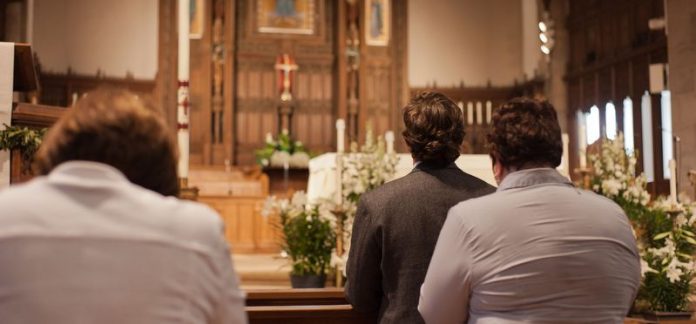
Planning adult faith formation
SR. JANET SCHAEFFLER, OP
The only man I know who behaves sensibly is my tailor; he takes my measurements anew each time he sees me. The rest go on with their old measurements and expect me to fit them.” This quote from George Bernard Shaw challenges us; as we design formation opportunities, what conversations are we having with people in the pews in order to “take the measurements” of their ever-changing needs?
Let’s explore several ways parish leaders can watch, listen, and ask to understand our parishioners’ needs.
GETTING TO KNOW THEM—Do we begin with letting them know we want to know them as individuals — with hopes, dreams, joys, concerns, struggles, etc.? For instance:
■ During parish registration, consider asking questions about their life situation, interests,
concerns, experiences with the Church, and preferred type of learning formats.
■ Complete the registration with a face-to-face welcome by a member of the staff or welcoming committee. This takes more time and energy, but in parish ministry, being effective is often more important than being efficient.
■ Pay attention to local news stories. These events might tell you instantly of the concerns your parishioners are experiencing.
■ Pay attention to the latest books and movies. What is currently capturing the imagination and interest of today’s adults, both in the religious and secular sphere?
LISTENING—Casually ask parishioners questions such as:
■ What do you like about our parish?
■ What changes have you noticed in the time that you have been a member?
■ What are some of your best memories of attending church here?
■ Is there something you would like to see us do?
■ Observing — Are we noticing:
◗ what people are doing with their time?
◗ the issues that adults are dealing with on a daily basis?
◗ the demands that people are facing regularly?
Have we ever walked outside the parish walls, taking a tour through our community and
compassionately seeing the reality of what people are dealing with daily? Would that spark ideas for formational opportunities of support and encouragement?
LOOKING AT WHAT IS ALREADY HAPPENING—There is probably much formation happening all the time; here are some ways to become more aware of it:
■ Consider the six dimensions of adult formation: knowledge of the faith, liturgical life, moral formation, prayer, communal life, missionary spirit. (See the USCCB document Our Hearts Were Burning Within Us [OHWB], pp. 91-96). Create a six-column table, placing one of these six dimensions at the head of each column. Brainstorm responses to the question: “What is our parish doing right now that forms adults in faith according to this dimension?” Remember the five approaches mentioned in OHWB: liturgy, family/home-centered
activities, small groups, large groups, and individual activities (see pp. 97-112). Not every formation opportunity takes place in a large group setting. Faith formation happens via many venues. Is your chart looking full? There may be more formation happening in the parish than you realize.
■ Invite the existing groups within the parish to recall their past activities and programs. Invite them to describe current activities that they feel are formational or educational. Have them list any formational activities that could or should be a part of their future. Then ask: “How can the adult faith formation committee and pastoral staff be supportive of your present and future efforts to grow in faith?”
■ Use one or more of the charts, “What Are We Providing for Adult Faith Growth?” found at CATmag.us/2OaonYN.
■ You might use the following questions — flowing from Appreciative Inquiry — in informal conversations and during parish registration:
◗ When you are feeling best about your membership in our parish today, what image of
parish life comes to mind?
◗ What is the single most important thing our parish has contributed to your life?
◗ What can you envision our parish doing in the next two to three years to call you and our
people to a deeper relationship with Christ, to living faith in everyday life?
Focus groups or think tanks
Invite people to a one-time meeting — no commitments, no ongoing responsibilities. Serve food and make it a lighthearted invitation and evening. You might go through your database and randomly select people (i.e., every tenth name), or you might invite people you know, but their “price of admission” is to bring someone with them that the
parish staff or committee probably doesn’t know. The preparation and outline of one such
think tank (“Ideas Mushroom in a Think Tank”) can be found at CATmag.us/2StDrEs.
Parish assembly
Many parishes hold a town hall or assembly for all parishioners once a year to assess needs and continue visioning and planning. Below are two examples of parish assemblies:
■ In the Process Is the Growth: available at CATmag.us/2OfQOVg
■ The Planning Process Involves Everyone: find this at CATmag.us/2Sw3v1R
This just scratches the surface of the multiple ways we can listen, watch, and ask so we are continually aware of the real needs of our parishioners. Several more ideas can be found under “Best Practices” at JanetSchaeffler.com, see 91-96.
Sr. Janet Schaeffler, OP, is involved in catechetical and adult faith formation, consultation, writing, workshops, days of reflection and retreats, and teaching. Find more at JanetSchaeffler.com.
This article originally appeared in Catechist magazine, April, 2019
PHOTO: LISA JULIE SUTTON PHOTOGRAPHY/BAYARD, INC




